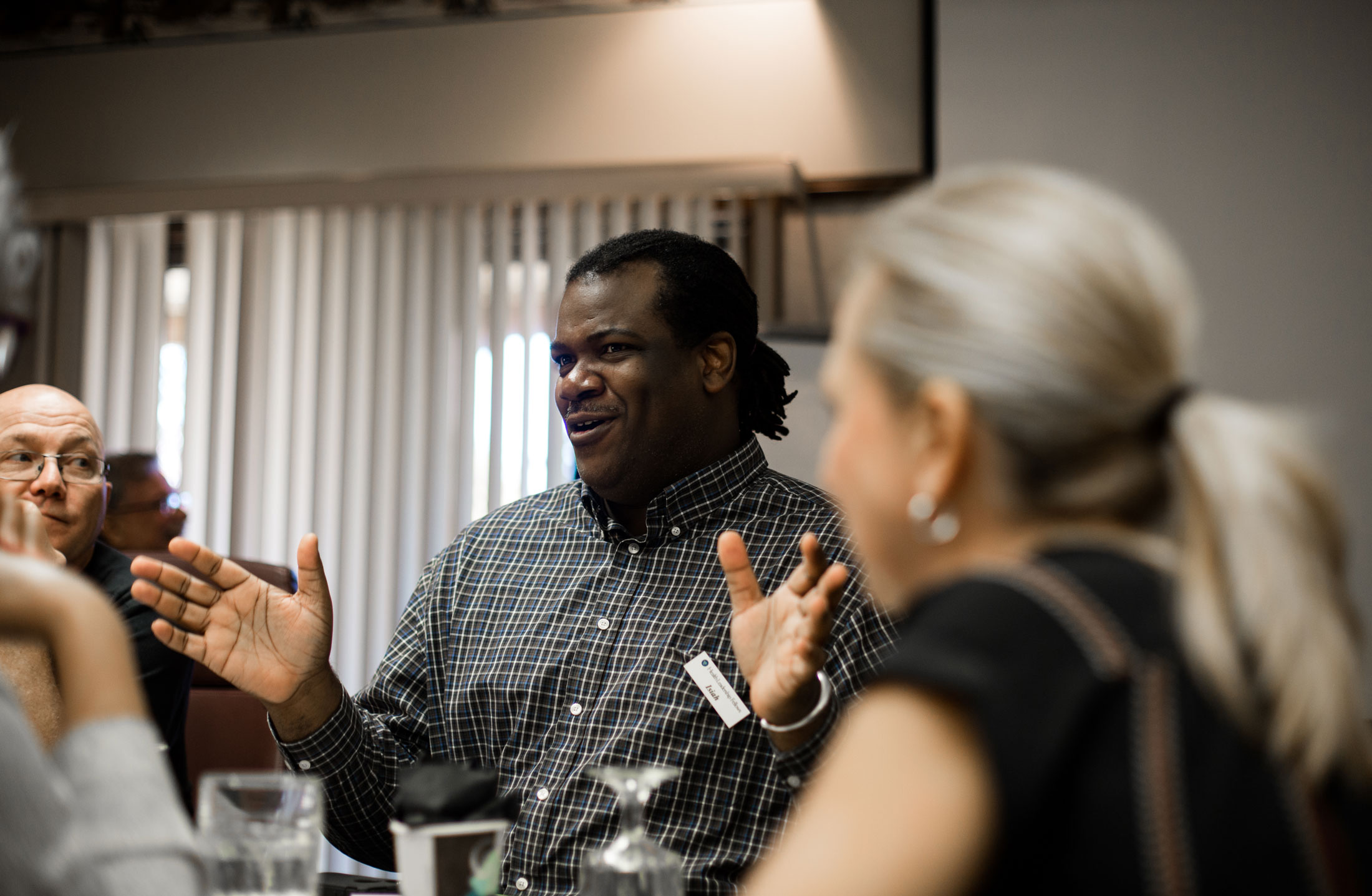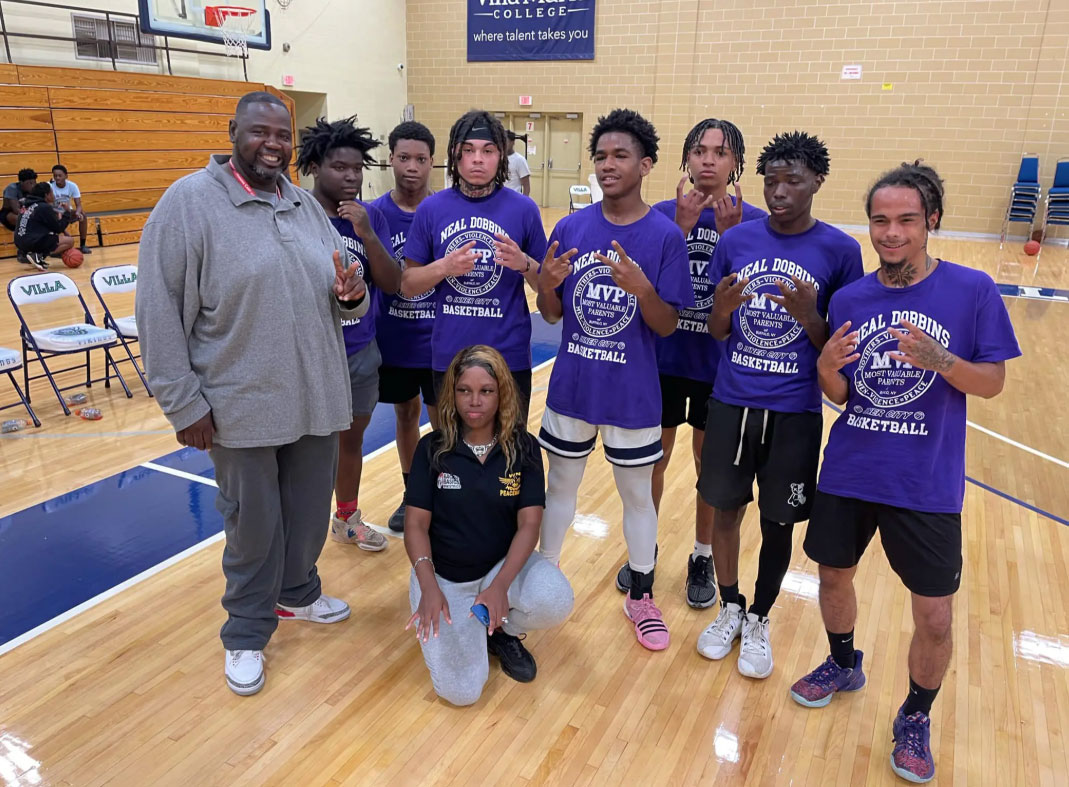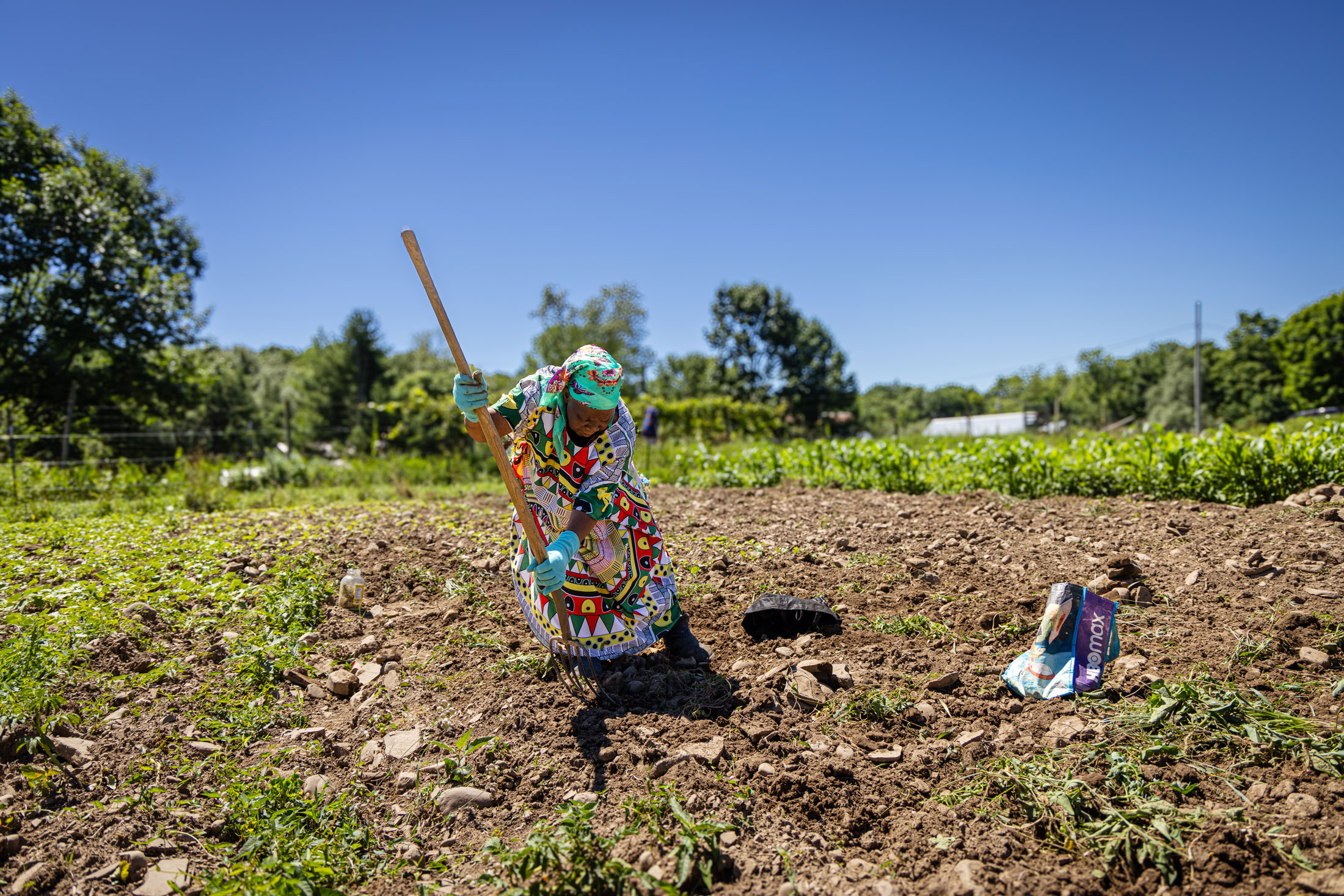2024 Annual Report
Health Leadership Fellows:
20 Years of Shaping Collaborative Community Leaders
Not all leadership programs are created equal. Take, for example, the Health Foundation’s Health Leadership Fellows program, designed for executives and managers from health-related nonprofit groups, safety-net organizations, and public agencies serving older adults and young children impacted by poverty. For 20 years, the 18-month program has been shaping the nonprofit leadership landscape in western and central New York.

“I don’t think I’ve seen anything at the systems level or the community level work without Fellows being at the table. And not just at the table—but leading.”
Dr. Marie Cannon, President & CEO, Community Action Organization of Western New York, Cohort 5
To build community health capacity, the Health Leadership Fellows program uses a multifaceted approach around professional development, organizational collaboration and problem-solving, and networking. Nonprofit leaders—who might otherwise be limited by the siloed nature of the health-related nonprofit ecosystem—are turned into passionate practitioners of sustained collaboration.
As any graduate will tell you, the program demands a high level of commitment. Fellows complete rigorous self-assessment exercises and attend intensive sessions on topics such as personal leadership, leading change, communicating as a leader, and results-based leadership. Executive coaching helps them confront their weaknesses and affirm their strengths, making it easier for them to apply everything they’re learning over the 18 months.
Health Leadership Fellows:
A Systems-Change Mindset
- How can I influence program decisions made by my agency?
- How can I influence my organization as a whole?
- How can I transform my community?
One unique aspect of the program is the culminating group project. Fellows team up and work on an inter-organizational project that’s focused on solving a specific problem to improve health outcomes within a community. Teams are encouraged to anticipate system-based limitations and leverage existing resources when developing their solutions. It’s an approach that helps each Fellow become highly adaptable and nimble —and well-positioned to lead in the community, even in times of scarcity.
Past projects have included: reducing the suicide rates of older men in Herkimer County, changing perceptions of memory impairment among older adults, providing crisis intervention training for nursing home staff, and improving the coping and resiliency skills of children under age five.
The variety of individual work and group collaboration provides a well-rounded foundation. By the end of the program, Health Leadership Fellows have developed an unflinching self-awareness of their own leadership style while honing their ability to share best practices across their organization and out in the community.
Fellows also come to understand that two of the strongest leadership traits are humility and vulnerability—to be willing to consider diverse perspectives and pursue potentially riskier, but ultimately more authentic and effective, collaborations. The result isn’t simply greater efficiencies and innovation, but a deep and abiding trust that anchors relationships and creates a resilient community-based network. This opens up numerous possibilities, the most powerful of which is systemic change and better health outcomes for all.
The foundational catalyst is the Fellows themselves—the way they lead, learn from each other, and leverage their ever-expanding network to influence change.
The Health Leadership Fellows Program was established in 2005. Ann F. Monroe, who served as President of the Health Foundation from 2002 to 2017, reflects on how—and why—it was created:
I could see that there were—as happens commonly in health care—some siloing of services in the community. There was an opportunity for them to be better networked.
The Board saw this as a priority. They came to realize that traditional models like a national training program, while very helpful for those who take part, might not have the long-term impact on the capacity of our health care system that we wanted. So we said, why don’t we turn that model on its head and build something that would foster long-term learning and collaboration? Instead of sending a select few off to a program, why don’t we bring those experts and that curriculum and network here? That was where the Health Leadership Fellows Program came from.
Ann tapped Virginia “Ginny” Oehler, a former CEO and veteran of the nonprofit world, to design and develop the new leadership program. The two agreed that the program should focus on internal aspects of leadership, but beyond that, Ginny was given a blank canvas to work with. She researched concepts of leadership and spoke with people who were running national leadership programs in different parts of the country. Some key questions guided her inquiry, and they soon shaped the elements of what would become the Health Leadership Fellows program: What are the components of effective leadership? What are the internal qualities of a leader? How does a leader have community impact? How can a leader learn to collaborate?
“My perspective was more about the internal factors and qualitative aspects, not simply quantitative. I wanted to understand different modes of leadership,” Ginny explains. “I had to challenge some of my own preconceptions to design a program that would challenge others to reflect, take risks, collaborate, and lead.”

Once a Fellow, Always a Fellow
Nancy Blaschak, Tracy Sawicki, and Marie Cannon still have vivid memories of their Fellows program experience.
Marie, who serves as President & CEO of the Community Action Organization of Western New York, is a graduate of cohort 5. She explains that the Health Leadership Fellows program helped her become a more attentive leader for her own staff. She was also able to strengthen her community relationships more quickly because of shared perspectives. “We were using the same language, and we were thinking about the work through the same kind of equity lens.”
Tracy, Executive Director of the Peter and Elizabeth Tower Foundation, also appreciates the ways in which the program facilitates close collaborations and community networking. Five of her staff have gone through the Fellows program, making it easy for everyone to align on values and priorities. “They’re people with a common understanding, common language, and common experience with some of the grantees we work with.” She’s witnessed their personal growth as a result of the program—just as she remembers her own.
While Tracy enthusiastically joined cohort 2, Nancy, who refers to herself as “the reluctant Fellow,” held out until the following cohort. A veteran executive, Nancy was enthusiastic about recommending the nascent program to others; she just wasn’t sure if it was right for her. She had been at the helm of the Greater Buffalo Chapter of the American Red Cross for decades—what more was there to know about being a leader? Health Leadership Fellows program advisor Virginia Oehler finally convinced Nancy to take the plunge and apply.
“I was the old dog that wasn’t going to learn any new tricks. But when I participated in the program, I learned lots of new tricks and it literally changed the way I managed the agency.”
Nancy Blaschak, former Executive Director of the Greater Buffalo Chapter of the American Red Cross, Cohort 3
Once immersed in the program, she became a convert. In fact, her belief in the Fellows learning approach became so strong that after graduating, she enthusiastically took on a program leadership role. Giving back to the Health Leadership Fellows program as a director became a labor of love.


Lessons from Covid-19
By 2020, the Health Leadership Fellows program was well-established, and over 300 Fellows alums were out in the community leading diverse organizations. The network proved resilient enough to withstand what was about to happen: a once-in-a-lifetime public health crisis.
When the Covid-19 pandemic hit the region, Health Leadership Fellows were the right leaders for that moment in history. They knew how to be nimble, improvise, and most importantly, collaborate. They set the tone for numerous productive initiatives to support healthier outcomes for the community, even amid a devastating public health emergency.
“One of the responsibilities of a leader during a time of crisis is to absorb the chaos and put calm back into the system,” Nancy explains. It’s a quality she believes comes more easily to leaders who have gone through the Health Leadership Fellows program. Fellows learn how to lean on each other, prioritize shared concerns, and keep the work going for the community. And they never lose sight of the big-picture goal: systemic change.
When reflecting on Covid-19, Marie agrees that the program had prepared Fellows to rise to the challenges. She explains it this way: “Because we had started the work and we were already collaborating, we could do the work as quickly and as efficiently as we needed to be for our community.” She’s sure it would have taken nonprofits much longer to respond, had they not been led by Fellows.

Meeting the Moment—Now, and in the Future
After 10 years, Nancy has stepped back as program director. Tracy and Marie were asked to serve as co-directors and will officially lead cohort 12. Like Nancy, they have a keen appreciation for how the program started and understand how it needs to keep evolving.
“It’s not going to be Covid, but it’s going to be a different kind of crisis. I think the relationships and the expertise that people have developed through this program will serve them well as they try to figure out how to get their organizations through it.”
Nancy Blaschak, who directed the program from 2015 to 2025
So what will the next few years be like for communities in western and central New York? And how will the Health Leadership Fellows program continue to meet the needs of the nonprofit ecosystem? The three friends believe that even during a time of existential uncertainty for so many nonprofits, Fellows have what it takes to join together, solve problems, and keep their communities moving forward. It’s about creating a network of leaders who have similar hurdles and can not only influence—but also accelerate—change.
Marie, Nancy, and Tracy all agree: The challenges will change, but the goals will stay the same. The key is to find leaders who can think about their work through a wider lens and across systems.
Alum Spotlights

Brett Lawton
CEO, Universal Primary Care
Cohort 4
Brett Lawton was serving as Chief Operating Officer for Jericho Road, a community health center in Buffalo, when his manager, Dr. Myron Glick, encouraged him to apply to be a Health Leadership Fellow. It was the professional nudge he needed to stretch himself and take some risks. Today he’s Chief Executive Officer for Universal Primary Care (UPC), a Federally Qualified Health Center serving residents of Cattaraugus and Allegany counties.
How did the Health Leadership Fellows program prepare you to be the leader that you are today?
I do think that the time and the focus on relationship-building helped me develop a trusted professional network. I could understand people who are like me or not like me and find ways to work with them.
I’ve gotten to building a really great team around me at UPC, and I just feel like we work really well together because we understand strengths. I understand their strengths, and they understand mine.
What did you enjoy about the program?
I loved the tools that were used to assess your own leadership. I think it did help me gain some extremely powerful insights as a leader and prepare me for future advancement. And the leadership coaching, working on a project together—all those activities were extremely helpful and exceeded my expectations.
What project did your team work on?
We looked at asthma on the West Side of Buffalo and the contributions to that from the trucks waiting at the Peace Bridge. We worked with the Asthma Coalition and a number of other entities to try to put together a focus group with individuals from the community to solicit input on what they cared about.
“The program is such a wonderful way to invest in the community and the leaders. It pays dividends, day in and day out.”
Brett Lawton, CEO, Universal Primary Care
Do you think being a Health Leadership Fellow changed you not only as a professional, but as a person?
It gave me a lot more confidence in myself. I still struggle in some ways, but I think there are so many tools that validate who someone is and what they’re worth and their value is. So I do think personally I gained a lot.
What would you say to someone who was thinking of applying to the program?
It’s such an investment in your own leadership and understanding yourself. It yields so much value through the relationships you build and the insights you gain.
Anything else you’d like to share?
I’m a city boy. I live in Buffalo, but I work in rural America. I partly chose my job because I wanted different inputs. I didn’t want to remain in my bubble of information—I wanted to understand how other people are experiencing the world.
There is a whole lot of poverty that doesn’t have to do with race, doesn’t have to do with ethnicity, doesn’t have to do with anything other than poverty itself and the complications that happen with poverty in America. And so I think having such a diverse array of participants in the Health Leadership program lets you have a different perspective on things.

Antara Mitra
Executive Director, Contact Community Services
Cohort 6
Antara Mitra was working at REACH CNY when she decided to apply for cohort 6 of the Health Leadership Fellows program. Eager for new professional opportunities, she wanted to learn and be challenged. The Health Leadership Fellows program delivered everything she expected—and more. While still in the program, she became Executive Director of the Community Action Program for Madison County. Today she is Executive Director of Contact Community Services, a human services organization dedicated to facilitating personal and social change, with a special focus on suicide prevention, to improve the quality of life in Onondaga County.
What led you to participate in the Health Leadership Fellows program?
I was vaguely familiar with it, but then my boss at the time, Liz Crockett, Executive Director of REACH CNY, who was in cohort 4, encouraged me to apply. At that point in my career, I realized I was missing a component. I had enough educational qualifications—I had two master’s degrees at that point—so I knew it wasn’t a question of going back to school.
Did the experience of going through the program meet your expectations?
Oh, absolutely! I think I got much more out of the program than I thought I would get. I feel like it really helped me understand my own decision-making process—you know, how I am motivated, what I’m motivated by, how I develop relationships with people. What I really liked was the opportunity to grow one’s network with a like-minded group of people in the same not-for-profit human services setting.
I feel like the reason I got so much out of it is because I was willing to be open and really listen and accept the feedback that was being provided to me.
“You have to be willing to go into something like this and let it change you.”
Antara Mitra, Executive Director, Contact Community Services
What else did the program teach you about yourself?
You learn your strengths and your weaknesses, but it also teaches you humility. There are just so many talented, wonderful people who bring so much to the table, whether you know it or not. I think that’s an important thing that the Fellows program has taught me—understanding how I’m built and that not everybody’s like me, and that’s okay.
Were there any surprises along the way?
My advisor and I were having our first one-on-one check-in, and she said she thought I was a natural leader. That totally blew me away because that’s not how I viewed myself.
What she told me really stuck with me. And I think that was the biggest surprise—discovering my leadership skills. I don’t know whether I would have applied for the leadership role with the Community Action Program for Madison County if it wasn’t for the Fellows program.
Anything else you’d like to share?
Because it was a long program, 18 months, it really created that space and the opportunity for different things to be revisited from different angles numerous times. It wasn’t just a one-and-done, but they kind of kept those threads running throughout in different ways—whether it’s through a project or through a reading or through discussions.
And I valued not just the smaller group, but even the larger group. Going away on the retreats creates that space for you to focus on yourself. It also creates space for conversations over dinner or conversations around the fireplace. That little extra time and space really helped me to internalize all the lessons.


